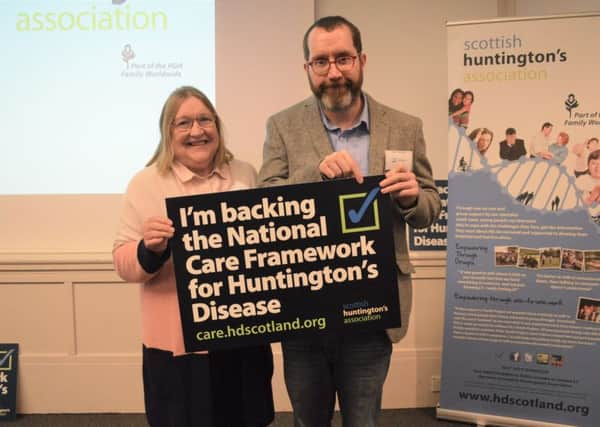Families in Southside and East Renfrewshire welcome Care Framework for Huntington’s Disease


For the first time families and health and social care staff have access to a comprehensive online register of services and resources designed to assist HD families in East Renfrewshire and across the Greater Glasgow and Clyde area.
It signposts up-to-date information on all the care and support that’s required for HD families, including facts about being tested for the disease, getting help with symptoms, help with finance and employment issues, help for young people and carers, care at the end of life, getting information about research and much more besides. The Care Framework for HD was pioneered by the Scottish Huntington’s Association and has been backed by the Scottish Government. It is the first of its kind in the world and has been seen as a model for HD care internationally and also for other long term conditions here at home.
Advertisement
Hide AdAdvertisement
Hide AdJohn Valentine, from Bellahouston, who has Huntington’s disease, attended the launch event with his mum Kathryn, who lives in Lanarkshire.
John said: “So often people think of a disease as affecting one person. However, Huntington’s disease affects entire families from generation to generation. When people find out that HD is in their family it can have a devastating impact, especially when they have no idea where to turn. The HD Care Framework stands to change that. Everything you need to know about the disease is all there in one place, helping and guiding families and health and social care staff. We urge everyone who cares about improving support to HD families to get behind the Framework to shape care for everyone who is impacted by this appalling disease.”
He was joined at the launch by Caroline Bamforth, East Renfrewshire councillor and Board member for NHS Greater Glasgow & Clyde.
Councillor Bamforth said: “It is fantastic to see families and staff from all across Greater Glasgow & Clyde coming together to shape this excellent tool. Having lost my father to MND, another neurological condition, I am greatly encouraged to read that the Scottish Government is hopeful that the HD Framework might also be used to help people with similar long term conditions in the future. This is an exciting prospect and I applaud Scottish Huntington’s Association for working so collaboratively with such a wide range of partners to make this a possibility. We wish this whole venture every success.”
Advertisement
Hide AdAdvertisement
Hide AdGeorge Adam MSP, Scottish Government Chief Whip, member of the Scottish Parliament’s Health Committee and Convener of the Cross Party Group on Multiple Sclerosis, said: “The HD Framework is a fantastic tool for local families who have been impacted by this terrible condition. It’s great to see the NHS Board and all local councils and health and social care partnerships getting behind it at today’s launch. If promoted and used effectively, this can make a huge impact of people’s lives. It’s no surprise that the international HD community is seeking to follow suit. And as someone who cares passionately about MS due to the impact it has had on my wife and family, it’s also encouraging to see MS charities being involved in its development and looking to it as a potential model. This is testament to Scottish Huntington’s Association’s open approach to developing this Framework, which I encourage everyone to get behind and make a success of.”
John Eden, Chief Executive of Scottish Huntington’s Association, added: “Family members and a full range of health and social care staff from East Renfrewshire and across Greater Glasgow and Clyde have been instrumental in developing this tool. We owe so much to them all for their guidance and support. This is a hugely significant piece of work that, if widely shared and used, has the potential to make a real difference to people’s lives.”
Huntington’s disease is a complex neurological condition with symptoms that typically begin to develop between the ages of 30 and 50. It is hereditary, meaning that it impacts upon entire families over generations rather than on individuals alone. Each child of a person with HD has a 50% chance of inheriting the condition.
As HD progresses it can affect a person’s movement (or motor skills), thinking processes (or cognition) and mental health. Those impacted by HD may eventually lose the ability to walk, talk, eat, drink, make rational decisions or care for themselves - requiring support for most or all of their activities on a 24-hour basis.
Advertisement
Hide AdAdvertisement
Hide AdAround 1 in 5,000 people in Scotland have HD. 1,100 people have been diagnosed with the disease with an estimated 4,000 – 6,000 at risk of inheriting it from their parents.
The HD Care Framework has been supported by the Scottish Government, all parties in the Scottish Parliament, the National Advisory Committee for Neurological Conditions, NHS Boards, Health & Social Care Partnerships, health & social care staff, professional bodies, HD family members, academics and national and international third sector partners. The National Framework can be viewed here. The Greater Glasgow & Clyde version can be viewed within the “Regional Frameworks” section of the site.